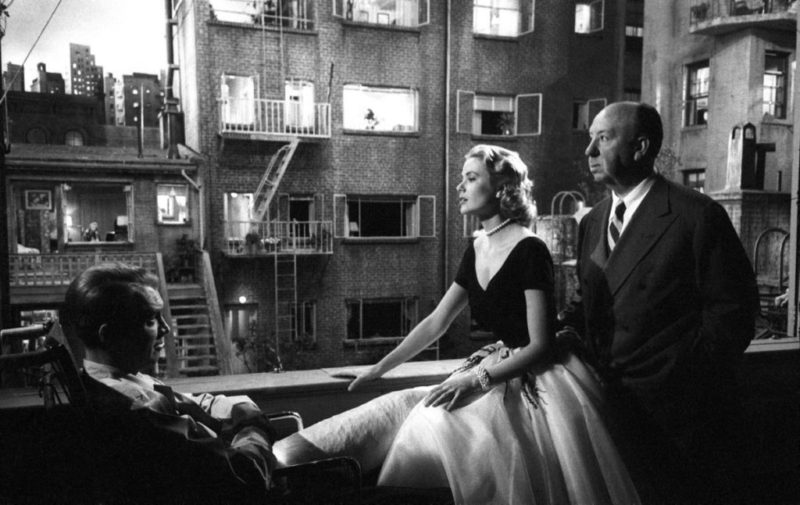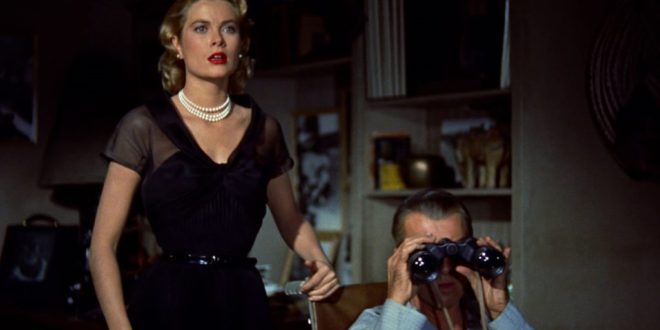What does it mean to say that an artist has changed your life? It would mean that he or she, somehow with their art, permanently shifted your perception of the world. It’s a rare occurrence when this happens, and there are few artists throughout history who have been capable of achieving such a feat for me… and Alfred Hitchcock is one of them. I can safely say that the man changed my life. Hitchcock made me afraid to shower and afraid of heights, and with one particular film he made 65 years ago, he made me afraid of my neighbors.
It’s astonishing to think that Rear Window (1954) is as old as it is because it still holds up so well. Having recently revisited the film in preparation for this piece, I was surprised by how relevant and relatable the film remains. I think that sentiment speaks volumes about Hitchcock’s deep understanding of human beings and of how we think and behave. Like the rest of his films, Rear Window is a story about people and how they interact with one another in day-to-day life. Most of us have probably seen the film, but for those of us who are unfamiliar, I’ll sum things up. (when you’ve finished reading this, find it online and watch it immediately)

Rear Window tells the story of an adventurous photographer named L.B. Jeffries (James Stewart: It’s a Wonderful Life 1946), or Jeff for short, who is bound to a wheelchair after a dangerous photoshoot has left him with a broken leg. While his leg mends, he is cared for by a brilliant cast of supporting characters, including his stunningly gorgeous, high-class girlfriend, Lisa (Grace Kelly: Dial M for Murder 1954), and his insurance company’s nurse, Stella (Thelma Ritter: All About Eve 1950). As a brutal heat wave strikes the city, Jeff keeps himself cool and sane by parking his chair beside his apartment’s opened rear window. Seeing as his neighbors also have their windows open to beat the heat, Jeff has a full-blown diorama view of their lives.
What begins as innocent snooping quickly turns into a dark investigation as Jeff begins to question whether or not one of his neighbors has committed murder. Using binoculars and his own camera equipment, the photographer begins to watch the man as he behaves peculiarly. As his suspicions grow, Jeff recruits the help of Lisa and Stella into figuring out what’s really going on behind the closed doors of the man’s apartment. Together, they follow a string of clues and observations to piece together the puzzle that verifies or denies what their grotesque imaginings have conjured.

I could go on summarizing the story, but I thought it’d be more fun to break down what keeps Rear Window feeling so fresh and relevant today. Hitchcock’s ability to understand people has never been more apparent than in this film. If we’re being honest, we’ve all spied on neighbors before in one way or another. We humans are curious by nature, and we’ve long been entertained by drama and gossip. When you’re living in an apartment complex in such close proximity to other people, drama is bound to unfold. Who can resist being a silent observer to the quirky personalities around us?
Hitchcock is quick to define the unique individuals around Jeff’s apartment block, and each one is given such depth and character through the smallest visual moments. The attractive dancer, the struggling composer, the lonesome bachelorette… they’re all so believable because they’re so realistic. Even the quiet salesman, the ultimate antagonist of the film, is so believably normal when we first meet him. His undoing is his behavior, of course, and how oddly peculiar Jeff finds it.
In turn, Hitchcock makes the audience just as suspicious of Jeff, and before we’ve been given all of the facts, we’re convinced this man has murdered his wife. This is the genius of Hitchcock. I know I’ve seen my neighbors lugging heaping, lumpy bags of garbage to the dumpsters in the early hours of the morning… and part of me dared to wonder what could possibly be in it. Most times, I’ve assured myself it’s just garbage, and have gone to bed without a second thought. But what if..?

Rear Window challenges you to do a double-take and really think about what could be buried in your neighbor’s garden, or what was in that suitcase he was carrying as he left the apartment abruptly late last night. After all, every killer has to be someone’s neighbor. It’s a sobering thought that we’re reminded of through watching this film, and it’s a story that’s as believable in 2019 as it was in 1954.
Hitchcock gifts us some of the most memorable thrills in cinematic history, and digs deeply into the psychology of what makes us most afraid. We often are wary of our neighbors. We tend to see strangers as “the other,” and we might even value privacy over things like acceptance and community. In today’s troubling times, this couldn’t be more true. As one character observes in Rear Window, neighbors are supposed to like each other and speak to each other. Obviously, this can’t always be true. You’re bound to butt heads with someone you live close to at some point in your life; but can’t we hope and maybe even make an effort to be friendly before we hastily shut ourselves off to one another?
Rear Window is careful to show us both outcomes of such a Utopian idea. We see the lonesome bachelorette finally find a partner in the troubled composer, and the composer is granted his muse. We also see that we were right to not trust the eerily emotionless salesman.
So where does this all leave us, 65 years later? In a world so divided as the one we’re living in, how do we reach out from next door and extend a friendly hand? Is it even wise to?
In the end, love and the power of community reigns supreme. Jeff’s accusations are validated, and it’s implied that he and Lisa have bonded through the experience. As the salesman is brought to justice, a sense of peace is restored, and the denizens of the apartment complex resume living in harmony with one another. Though Hitchcock is always eager to show us the darker side of the world, he does his best to also believe in its good. The ultimate message of the film is not that Jeff was a nosy neighbor, but that he was a guardian when the neighborhood needed one most.
I love this movie, and I’m relieved to say it has aged remarkably well. I can’t recommend it enough. Happy 65th Birthday, Rear Window.
 PopHorror Let's Get Scared
PopHorror Let's Get Scared




